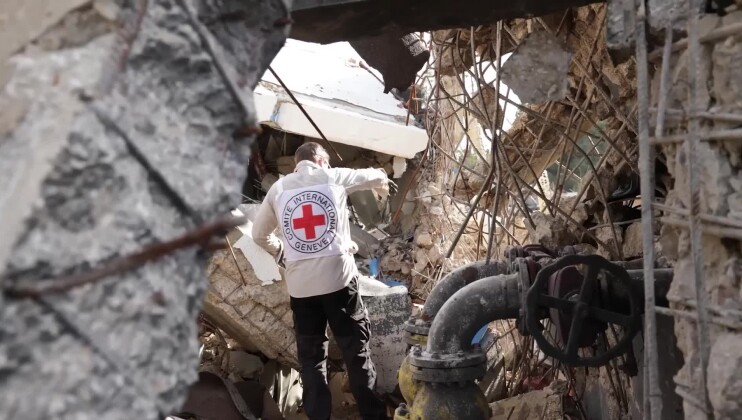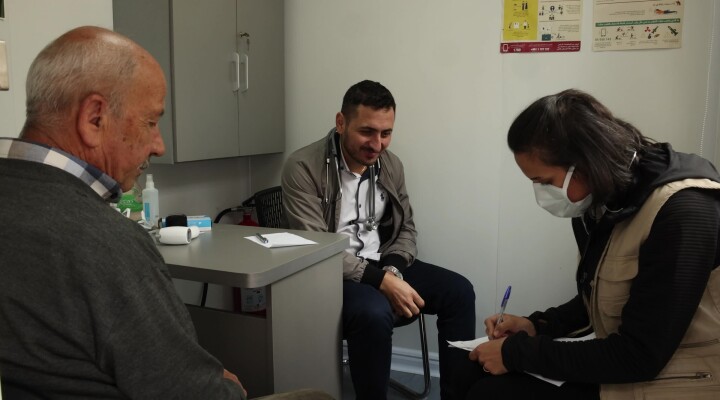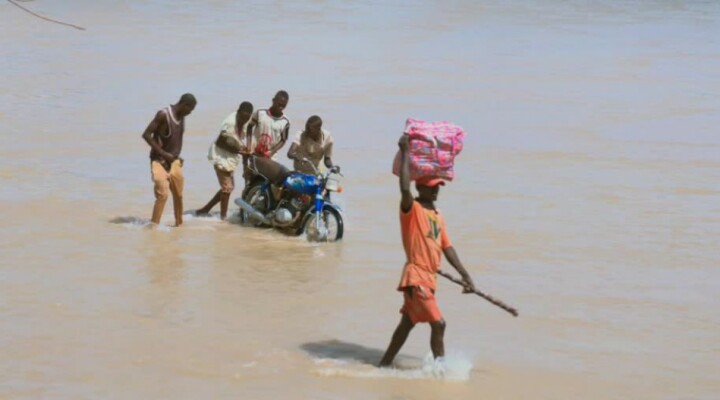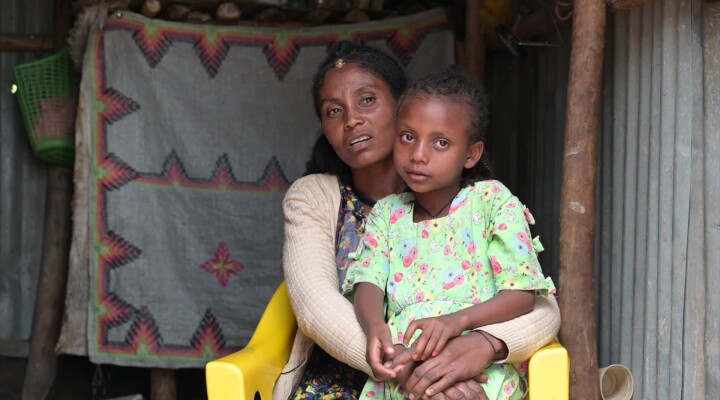International Day of the Disappeared - Ukraine: Unbearable uncertainty for families of the missing
For more than three years, eastern Ukraine has suffered conflict. Amid the world’s many other humanitarian crises, in Syria, or in Yemen for example, it can be easy to forget Ukraine. But the UN estimates that 10,000 people have lost their lives here since 2014. Thousands of families are grieving, and many, like Yuliia and Olha, have been condemned to wait for years to find out exactly what happened to their loved ones.
“These are our fathers,” says Yuliia, taking a framed photograph off the shelf. “This one is Olha’s father, Serhii Uzakov, and this one here is my father, Volodymyr Bondarenko.”
The two men disappeared almost three years ago.
“It was November 27th 2014,” remembers Yuliia. “A group of armed men broke into our fathers’ farm. People who saw what happened told us they wore camouflage, and balaclavas. And they knew our fathers’ names.”
In another village, close to the contact line, Elena waits desperately for any news of her daughter Yana.
“On September 17th 2014 my daughter went missing,” Elena explains. “We do not know the circumstances. We have had no news of her since that day.”
Elena and her parents are caught in an unbearable limbo of uncertainty, waiting to hear from their beloved daughter and granddaughter Yana. According to the International Committee of the Red Cross, over one thousand five hundred people are still believed to be missing in Ukraine, although the exact number cannot be established with certainty. Until the missing are found, their families suffer.
“The main need of the families is to know what happened to their loved ones, based on the right to know that they have, also enshrined in International Humanitarian Law,” explains Mariana Chacon Lozano, who is Coordinator for the Missing File with the ICRC in Ukraine.
“Then they also have emotional, psychosocial needs,” she continues. “Because of the heavy burden that the uncertainty represents. Just not knowing often isolates them from their community: they are not very willing to talk about these issues, so that is also something that we need to take into consideration. And they also have financial needs; often it is the case that the person who goes missing is the breadwinner.”
The ICRC is a neutral and impartial intermediary, and it is working with all parties to the conflict to try to trace missing persons, and bring some certainty to their relatives. Tragically for many families, the long waiting often ends with news of the worst kind.
After almost three years of looking, Yuliia and Olha now know for sure that their fathers are dead, and they have at least been able to bury them. The end of uncertainty, and having a grave to visit, has brought them some relief.
“I come here,” says Olha. “I imagine that I am talking to him. I ask him for guidance. It’s as if we were talking on the phone: I call him and we just talk. And he answers, there is a sign of some kind; a bird sings, or the wind blows.”
The ICRC continues its support for families of the missing even after the fate of a relative becomes known. As ICRC psychologist Victor Blinov explains, being able to talk about their feelings can help families to regain a purpose in life.
“It helps them to start a normal life again, to continue, to move on in their own lives.”
But, Victor adds, “We are not talking about the healing of this trauma, healing of this loss – it's impossible.”
Yana’s mother and grandparents are still waiting. The family’s grief and stress are compounded by the fact that it is not the first time they have had to mourn a missing loved one. Grandfather Aleksandr’s father disappeared in Germany in the second world war.
“We waited for our father,” remembers Aleksandr. “Our mother had three children. But our father never came back. It’s as if he vanished into thin air; he has not returned to this day.”
Aleksandr knows his father will now never come back. But Svetlana clings desperately to the hope that she will see her granddaughter again.
“Please, if possible, help us find our child” she says. “Even the smallest piece of information about her.”
Far from the front line, life in Ukraine may look normal at first glance, but for the families of the missing, it is anything but. Even if the conflict were to end, they will know no peace until they learn what has happened to their loved ones.
Facts and Figures
The ICRC has 640 open cases of people registered as missing in Ukraine. Work is ongoing trying to trace the missing, and to raise awareness with the authorities and the general public to ensure that information about the missing, and about unidentified remains, are shared.
The ICRC is providing psychosocial support to families of the missing in the Severodonetsk region of Ukraine.
Typical symptoms suffered by relatives of the missing are insomnia, nightmares, anxiety, and depression.
The ICRC has set up a cash assistance programme for 80 families of the missing in Ukraine: many suffer financial problems, because the missing relative was the chief income producer.
Download this footage from ICRC Video Newsroom
For further information, please contact:
Elodie Schindler, eschindler@icrc.org, Mob +41 79 536 92 48
Matt Clancy, mclancy@icrc.org, Mob: +41 79 574 15 54
To find out what the ICRC is doing to support people in Ukraine, go to:
https://www.icrc.org/en/where-we-work/europe-central-asia/ukraine
Follow the ICRC on facebook.com/icrc and twitter.com/icrc
SHOT LIST
Length: 5:40
Format: HD H264 mov
ICRC ref: AV667N
Date: 4-16 June 2017
Copyright: ICRC access all
0:00 – 0:04 WS destroyed house
0:04 – 0:08 MS destroyed house, trees
0:08 – 0:12 old man walking down street
0:12 – 0:18 people shopping on street
0:18 – 0:21 Geese in Yuliia’s farmyard
0:21 – 0:25 house with destroyed roof
0:25 – 0:30 Olha and Yuliia hugging
0:30 – 0:33 photograph of fathers with trophies
0:33 – 0:45 soundbite Yuliia (original Russian) “These are our fathers. This is one is Olha’s father, Serhii Uzakov, and this one here is my father, Volodymyr Bondarenko.”
0:45 – 0:49 CU photographs of fathers
0:49 – 0:57 Olha pointing to photographs
0:57 – 1:31 soundbite Yuliia (original Russian) “It was November 27th 2014. A group of armed men broke into our fathers’ farm. People who saw what happened told us they wore camouflage, and balaclavas. And they knew our fathers’ names.”
1:31 – 1:35 Elena in daughter Yana’s bedroom
1:35 – 1:38 Elena holds up Yana’s photograph
1:38 – 1:42 CU Yana photograph
1:42 – 1:55 soundbite Yana (original Russian) “On September 17 2014 my daughter went missing. We do not know the circumstances. We have had no news of her since that day.”
1:55 – 1:59 Photos of Yana with icons
1:59 – 2:03 Elena and grandmother Svetlana with photos of Yana
2:03 – 2:08 Photo of young man on wall with icons
2:08 – 2:12 elderly lady sorting photographs
2:12 – 2:16 MCU photo of two young men
2:16 – 2:47 Soundbite Mariana Chacon Lozano, Coordinator for the Missing File, ICRC Ukraine. (Original English) “The main need of the families is to know what happened to their loved ones, based on the right to know that they have, also enshrined in International Humanitarian Law. (Attention internal edit at 2:25). Then they also have emotional, psychosocial needs,” she continues. “Because of the heavy burden that the uncertainty represents. Just not knowing often isolates from their community: they are not very willing to talk about these issues, so that is also something that we need to take into consideration. And they also have financial needs; often it is the case that the person who goes missing is the breadwinner.”
2:47 – 2:52 ICRC vehicles on country lane
2:52 – 3:01 ICRC vehicles different angle
3:01 – 3:17 Yuliia and Olha getting into ICRC vehicle
3:17 – 3:22 Yuliia and Olha enter graveyard
3:22 – 3:25 Photo of father with flowers at grave
3:25 – 3:29 Yuliia tending grave
3:29 – 3:34 Yuliia and Olha at graveside
3:34 – 3:58 soundbite Yuliia (Original Russian) “I come here. I imagine that I am talking to him. I ask him for guidance. It’s as if we were talking on the phone: I call him and we just talk. And he answers, there is a sign of some kind; a bird sings, or the wind blows.”
3:58 – 4:01 ICRC delegates talking with elderly man
4:01 – 4:06 Elderly couple and ICRC vehicle
4:06 – 4:11 Elderly woman gets into ICRC vehicle
4:11 – 4:27 Soundbite ICRC psychologist Victor Blinov (original English) “It helps them to start a normal life again, to continue, to move on in their own lives. We are not talking about the healing of this trauma, healing of this loss – it's impossible.”
4:27 – 4:31 Photos of Yana next to icons
4:31 – 4:36 Elena and Svetlana making tea
4:36 – 4:48 Aleksandr at dacha with vegetables
4:48 – 5:06 soundbite Aleksandr (original Russian) “We waited for our father. Our mother had three children. But our father never came back. It’s as if he vanished into thin air; he has not returned to this day.”
5:06 – 5:08 CU Aleksandr eyes
5:08 – 5:12 CU Aleksandr hands
5:12 – 5:20 soundbite Svetlana (original Russian) “Please, if possible, help us find our child. Even the smallest piece of information about her.”
5:20 – 5:25 Elena and Svetlana on balcony
5:25 – 5:30 Woman goes by on bicycle
5:30 – 5:40 Elderly woman sorts through old photographs



